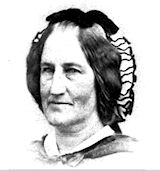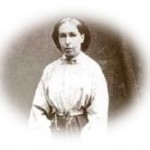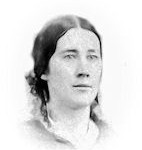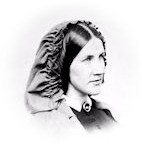On September 17th the fierce battle of Antietam was fought by the Army of the Potomac,—a drawn battle, little better than a defeat for us; and though the rebels retired there was no following up on our part, and no result worth the enormous loss of life.
And now the moment had come for the war-measure Mr. Lincoln had held in reserve. The Government had been fighting to uphold the Government, and announcing all along that if the abolition of slavery proved needful to that end, then slavery should cease.
On September 22, 1862, Mr. Lincoln issued a preliminary proclamation declaring that in all States found in rebellion on January 1, slaves should “thenceforth and forever
be free.” Congress, however, delayed to take the action urged upon them by the President, until the time limit expired.
.
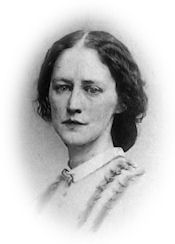 Jane Stuart Woolsey to a friend abroad.
Jane Stuart Woolsey to a friend abroad.
8 Brevoort Place, N. Y.
October, 1862.
The fighting at Cedar Mountain and Gainesville and on futile fields of Manassas, the mysterious ups and downs of commanders, the great invasion scare, the mean dissensions and the sad delays, have kept us constantly agitated, the more so that we were in the tauntingly still and sweet country, where the newspaper train was sure to fail in great emergencies. There was a time,—I confess it because it is past, when your correspondent turned rather cold and sick and said “It is enough!” . . . and when my sister Abby, (who acknowledged the Southern Confederacy when the rebel rabble got back unpursued across the river from Winchester), went about declaiming out of Isaiah, ” To what purpose is the multitude of your sacrifices; your country is desolate, strangers devour it in your presence.” . . . We came out of that phase, however, at any rate I did, and concluded that despondency was but a weak sort of treason; and then with the first cool weather came the Proclamation, like a
.
“Loud wind, strong wind, blowing from the mountain,”
.
and we felt a little invigorated and thanked God and took courage. . . . In Litchfield we followed with great interest the growth of the 19th Connecticut recruited in that county, all the little white crumbs of towns dropped in the wrinkles of the hills sending in their twenty, thirty, fifty fighting men; Winsted, Barkhamsted, Plymouth companies, and companies clubbed by the very little villages, marching under our windows every day to the camp ground. Almost all the young men in Litchfield village have gone; the farmers, the clerks in the shops, the singers in the choir. Who is to reap next year’s crops? Who is to sow them? Everyone spoke well of the new recruits. There was not a particle of illusion for them. They understood very well to what they were going; disease, death, a common soldier’s nameless grave. They made themselves a new verse to the marching song:
.
“A little group stands weeping in every cottage door,
But were coming, Father Abraham, three hundred thousand more.”
.
General Tyler went over to Danielsonville to look at a company just raised in that town, and was waited on to know if another company would be accepted. “If it is here this time tomorrow,” he answered in jest. It was there. It is not altogether a question of bounty. A fine young fellow came into our hotel a day or two after the bounty-giving ended, to inquire the way to camp. Charley asked him, “Why didn’t you come before the pay stopped?” “That’s just what I was waiting for,” he answered; and a dozen men went from the village to whom the bounty could offer not the slightest inducement. The Congregational clergyman told us he looked over the growing list of names with tears, knowing what good names they were and how ill they could be spared. But the 19th Connecticut is no better than a hundred other regiments. There are very few men in the 18th Connecticut who are not persons of weight and value in their community, cousin Mary Greene says. And see how they fight! Look at the Michigan Seventh at South Mountain. The Michigan Seventh was two weeks old. And yet it is coming to us from over the sea that we can’t get men, and if we do they will run! . . .
The generalship and fighting of the rebels is also certainly very fine—corn-cobs and no shoes are pathetic when one forgets the infamous cause. . . . Their “obsolete fowling-pieces” go off with considerable accuracy, says a malcontent at my elbow.
When we came to town last week the streets seemed full of anxious and haggard faces of women, and when I caught sight of my own face in a shop glass I thought it looked like all the rest. The times are not exactly sad, but a little oppressive. . . . G. and I cannot stand it any longer and we are off to-morrow. We are in the government service now and entitled to thirteen dollars a month![1] We are going into exile—a blessed exile.
[1] At the Portsmouth Grove Hospital, as assistants to Miss Wormeley.
